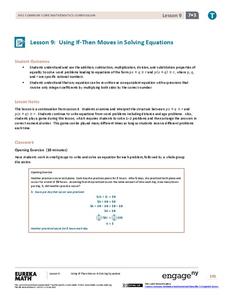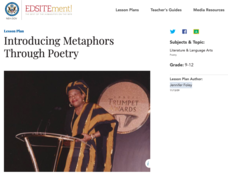Texas Education Agency (TEA)
Archetypes, Motifs, and Plot in Drama (English II Reading)
The second interactive in a series of 10 introduces young scholars to character archetypes, archetypal plot patterns, and archetypal motifs, including the use of color. Learners read passages explaining the term and study examples from...
Texas Education Agency (TEA)
Imagery (English III Reading)
Picture this! The first interactive in a set of 13 shows learners how writers use imagery and sensory details to create mental pictures in readers' minds.
Texas Education Agency (TEA)
Paradox (English III Reading)
Pairs of contradictory words introduce learners to paradoxes, the literary device writers use to get readers thinking deeply about their messages. An interactive lesson uses poems by Emily Dickinson and Wilfred Owen and excerpts from the...
Poetry4kids
How to Create Book Spine Poetry
Can you create a poem without writing a word! With found poetry, you can! Practice one version of found poetry with a lesson on book spine poems. Learners create poems by stacking books and reading the lines created by their spine titles.
EngageNY
Using If-Then Moves in Solving Equations II
Continuing from the previous lesson in the 28-part series, learners write equations to model problem situations. They then solve the problem by applying the properties of equality. In contrast to the previous lesson, they do not write...
National Endowment for the Humanities
George Washington: The Precedent President
Everyone knows that George Washington was the first president, but do your scholars know why that was so important? The lesson plan, the third in a sequence of three, allows learners to understand how George Washington set a precedent...
ReadWriteThink
Word Recognition Strategies Using Nursery Rhymes
As a class, scholars read the poems, Humpty Dumpty, Peter, Peter, Pumpkin Eater, and Jack and Jill, in order to identify words with the same ending sound. Using their rhyming skills, learners brainstorm additional words...
National Endowment for the Humanities
Introducing Metaphors Through Poetry
Metaphors are word pictures, creating images in our brains that draw readers to consider how two seemingly unrelated items are alike. Poems by Langston Hughes, Margaret Atwood, and Naomi Shihad Nye provide learners with an opportunity to...
Kelly's Kindergarten
Kelly's Kindergarten: P Words
From paperclips to pencils and pigs, your young learners will have a party identifying words that begin with the letter P! They begin by cutting and pasting images of those words to a worksheet, and then practice writing capital and...
Kelly's Kindergarten
Kelly's Kindergarten: The Letter S
Sandwich, start, sun. What do all of these things have in common? They start with the letter S! Learners choose the six images that start with the letter S, cut them out, and glue them to the page. They then practice writing the letter S...
Curated OER
Vocab-u-lous! Build a Fabulous Vocab: December Holidays
Find a celebration of winter holidays in a versatile and straightforward worksheet. Learners read a bank of holiday-themed words, including asceticism, solstice, and myrrh, and use context clues to place them in the...
Pingry School
Effect of Solutes on Boiling Point
Anyone that lives around snow knows that adding salts to water increases its melting point. Are there solutes that affect the boiling point as well? A scientific experiment has learners add different solutes to water and then...
Pingry School
Liquid Chromatography
A hands-on experiment applies chromatography to separate both the colors and components of grape-flavored Kool-Aid. Performing two separate activities, learners first use chromatography to divide the colors. The second activity results...
Pingry School
An Introduction to Qualitative Analysis
Compounds take on different properties than their elemental components. How can scientists determine those elements? A lab-based activity has learners explore several double replacement reactions to analyze compounds qualitatively. They...
Kelly's Kindergarten
July Daily Activities
Concerned about your learners forgetting what they've learned during summer vacation? Use a learning guide to keep them busy every day of the week. With activities about writing, drawing, counting, adding, and time, your kids will be...
Kelly's Kindergarten
April Daily Resources
Spring has sprung in your classroom! An entire month of activities relating to spring prompts learners to color, draw, write, and work on phonics.
Other popular searches
- Diverse Learners
- Kinesthetic Learner
- English Language Learners
- Adult Learners
- Kinesthetic Learner Math
- Literacy Kinesthetic Learner
- Diversity of Learners
- Second Language Learners
- English Learners
- Learner Log
- Lessons for Diverse Learners
- Community of Learners















